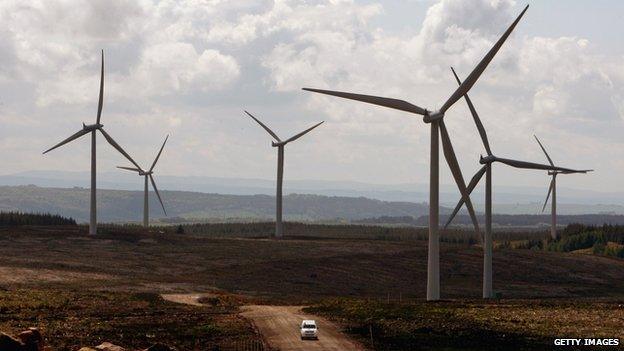Renewable electricity pace 'needs to quicken', Audit Scotland say
- Published

The Scottish government has been urged to start reporting progress towards its overall target
The rate that green power projects are coming online needs to double to meet renewable targets, auditors have said.
Ministers want Scotland to generate an equivalent of 100% of electricity demand from renewable energy by 2020.
Audit Scotland said meeting targets would be challenging but the Scottish government does have a clear strategy.
The government said it was on course to meet interim targets but acknowledged economic conditions had seen projects progress more slowly than anticipated.
Public sector spending on renewables in the past 10 years totals £209m. An industry body said this was matched by £1.5bn investment in 2012 alone.
The Audit Scotland report looked at public sector investment and what has been delivered to date.
On top of the 2020 electricity target, there is an 11% target for renewable heat demand and 10% for renewable transport.
This combines to create an overall target to meet 30% of the country's total energy consumption from renewable sources by 2020.
Steady progress
In 2012, the renewable share of electricity demand stood at 39.2%, heat at 4.1% and transport at 3.2%. Figures for the overall 30% energy consumption target are not currently reported.
On electricity, the report added: "We estimate that to meet the renewable electricity target alone, average annual increases in installed capacity need to double."
Other findings in the report included:
Scotland is making steady progress towards meeting its renewable energy targets for 2020, but achieving them will be challenging.
Renewable energy projects are progressing more slowly than expected, due to the economy and changes in UK energy policy.
The government expects renewable energy to deliver up to £30bn investment and 40,000 jobs. It needs to improve its recording of private sector investment and work with other public bodies to develop more realistic employment projections.
Auditor General for Scotland Caroline Gardner said: "Scotland's strategy for renewable energy is a good example of clear leadership and direction supported by integration across other policy areas.
"While there are aspects the Scottish government and other public bodies should improve, the main challenge is that private sector investment has been slower than expected, reflecting the state of the economy and the uncertainty of developments in the wider UK energy sector.
"The Scottish government needs to better report what has been achieved so far and, along with Scottish Enterprise and Highlands and Islands Enterprise, identify what extra steps they can take to accelerate progress."
The report concludes that the Scottish government should:
Clarify the role of renewable heat within its wider vision for Scotland's future energy mix.
Agree a methodology to monitor its target for overall energy demand and start reporting progress against it by the end of 2014.
Identify additional steps to accelerate the development of infrastructure to support the offshore wind industry.
Energy Minister Fergus Ewing said investment was helping transform the renewable energy industry and that Wednesday's draft budget contained a further £200m for key schemes for 2014/15 and 2015/16.
Mr Ewing added: "However, we recognise, as the report does, that renewable energy projects are progressing more slowly than anticipated owing to factors such as the current economic climate and changes in UK energy policy.
"With the uncertainty surrounding UK energy policy we are responding to these market conditions by re-profiling our renewables budget, including our flagship Renewable Energy Investment Fund, so that the sector can be confident of continuing support into the future."
Niall Stuart, chief executive of Scottish Renewables, said: "The report highlights the clear and strong energy policy from the Scottish government, which has given the industry confidence to invest and build in Scotland, with output of renewable power doubling in the last five years as a result."
He added: "We agree with much of the report, particularly around the need for greater focus to be given to renewable heat.
"In Scotland, heat constitutes more than 50% of energy demand and we believe there is a strong case for renewable heat to play a much bigger role in helping tackle fuel poverty."
- Published1 August 2013
- Published23 July 2013
- Published30 April 2013